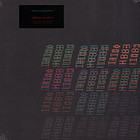In the past, Portico Quartett’s jazz was significantly coined by the Hang. The Hang, having come into existence in Berne in the year of 2000, is an instrument made of two riveted hemispheres with notches hammered into their surface. It’s mostly played by hand (»Hang« is Swiss-German for »hand«) and produces a voluminous, organic and somewhat exotic sound. When the Hang-player, Nick Mulvey, left the band last spring, they needed to find new ways to make up for that loss – their third and self-titled album indicates that compensation. As a compensation-method, the Brits chose audacity. At first, they started working with samples and loops, and through this electronic approach, they also managed to domesticate the ownerless Hang. Then, the drummer Duncan Bellamy, bassist Milo Fitzpatrick and saxophonist Jack Wyllie integrated the keyboarder Keir Vine as yet another fourth man. He was to enable the Portico Quartet to another facet of their sound. Eventually, the musicians (who don’t think very puristic, anyway) broadened their sound by more and more different influences. While minimalism, modern classic and world-music had already belonged to their spectrum of sounds, it was now extended by all kinds of electronic influences. Or, to put it differently: When in the past, the Portico Quartet brought together Soft Machine, Steve Reich and the music of AACM-members, they’re now also interested in what’s going on in London’s club-scene. As a result, their sound has become less light but also more heterogeneous. Still, Portico Quartet is a jazz-album recorded completely live, and it’s incredible to see how instinctive and confident the four musicians relate to each other when playing together. Especially when thinking of the audacity to move towards these unknown territories, this confidence can’t be emphasized enough. Still, tracks like Lacker Boo or 4096 Colours prove that electronic music, with all its possibilities, can do certain things simply better than jazz could. And those are exactly the parts, in which the Londoners just want a little too much. On the other hand, City Of Glass shows how it can work just fine, and not even Lamb could have done a track like Steepless any better.
Portico Quartet
Next Stop EP
Gondwana



